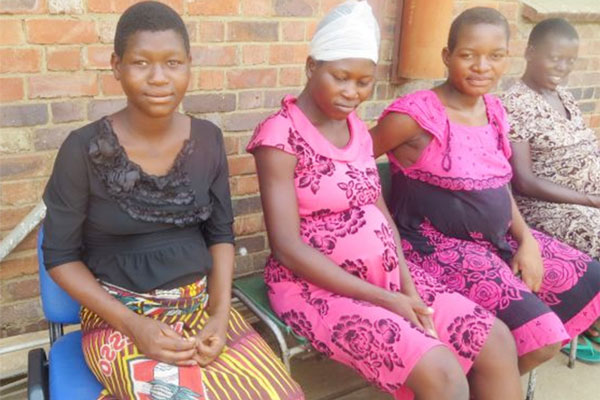
At 21, Tendai Matekenya is already a divorced mother of two having endured a seven-year abusive marriage.
By Moses mugugunyeki

Matekenya, from Pfinyanguwo village in Rushinga, is now employed as a housemaid at a suburb in Harare in order to take care of her two children following the death of her husband.
She said she was compelled to marry her late sister’s husband at the age of 14 through a Zimbabwean traditional custom known as chimutsamapfuwa.
Matekenya’s predicament is faced by a myriad of girls in Zimbabwe who have not been protected by the law and whose fundamental civil liberties have been violated because of traditional practices and norms.
Despite Zimbabwe having ratified various international conventions and declarations on child rights, particularly the Convention on the Rights of the Child (1989) and the Convention on the Elimination of All Forms of Discrimination against Women (1979), many girls continue to suffer at the hands of discriminatory laws.
Zimbabwe has put in place various national legislative instruments aimed at guaranteeing the girl child’s legal rights, particularly the Marriage Act, which allows girls to marry at the age of 18, thanks to the January 2016 Constitutional Court landmark judgement which declared 18 years as the legal minimum age of marriage. The court ruling also deemed all forms of child marriage unconstitutional.
Despite the milestone ruling coupled with international conventions as well as domestic legislative instruments, child marriages remain prevalent in Zimbabwe, particularly in rural communities where customary law has been allowed to override formal law.
- Chamisa under fire over US$120K donation
- Mavhunga puts DeMbare into Chibuku quarterfinals
- Pension funds bet on Cabora Bassa oilfields
- Councils defy govt fire tender directive
Keep Reading
According to UNFPA, globally, one in every five girls is married, or in a union, before reaching the age of 18 years. In developing countries, Zimbabwe included, more than 32% of girls are married before the age of 18 and 12% are married before the age of 15. In Zimbabwe approximately one in three girls are married before the age of 18 years.
“When my sister died, I was 12 years old and I was told I would marry her husband when I turned 14,” said Matekenya.
“Just a month before my 14th birthday, I became a bride although there was a lot of resistance from my mother, who at one time threatened to commit suicide.”
Matekenya said her marriage to her then 35-year-old husband had the blessing of a local traditional leader.
Many girls like Matekenya suffer due to the conflict between formal and customary legal systems that is frequently unaddressed.
“In the case of child marriages, customary law has been allowed to prevail over legislative instruments,” said Harare-based sociologist Yotamu Chirwa. “There are increasing cases of child marriages in society and little is being done legally to deal with that.”
While some countries like Mozambique, Zambia, Uganda and Ghana, among others, have come up with strategies and policies to curb child marriages, Zimbabwe has none, save for the January 20, 2016 Constitutional Court ruling.
Child rights activist Nyari Mashayamombe said the issue of child marriages in Zimbabwe was an elephant in the room. She said there was lack of political will considering the high prevalence rate of child marriages, particularly in rural areas.
“Government has been promising the Child Marriages Bill that enforces the law on perpetrators and offenders, but it has been five years since the new constitution was put in place and nothing has materialised,” said Mashayamombe.
She said overcoming child marriages requires a multi-pronged approach that ensures all Zimbabweans play their part.
“First of all, society must understand the negative effects of child marriages such as perpetual cycles of poverty, maternal mortality, marginalisation of women in positions of leadership, GBV and dragging in development among many issues,” she said.
“Secondly, there must be water-tight laws that should be backed up by a strong justice system that delivers for the best interests of the child.”
Zimbabwe Gender Commission CEO Virginia Muwanigwa said the commission had embarked on sensitisation workshops through traditional authority structures with the aim of transforming communities to be more sensitive on sexual and reproductive health and rights.
“The Zimbabwe Gender Commission has done a research on child marriages. The commission is raising awareness on gender-based violence by talking to gate-keepers of culture, traditional leaders and communities to eradicate this problem,” she said.
“The commission has also added its voice to those calling for more protection of the girl child in line with the constitution. This includes calling for alignment of laws to give effect to the constitution.”
Human rights lawyer Tinashe Mundawarara from the Zimbabwe Lawyers for Human Rights said the law was very clear on child marriages.
“The legal minimum age for marriage is 18 years and in terms of Section 78 of the constitution, only persons who have attained 18 years can be married,” he said.
“This provides protection to young girls and the Constitution is the supreme law of the land and Section 2 states that any tradition or custom that is inconsistent with the provisions of the constitution is invalid to the extent of such inconsistency. This, read together with Section 80 (3), makes it clear that child marriages are not permissible.”
Matekenya, who dropped out of school when she was in Grade 7, said it is time for certain cultural norms and practices related to sexuality to be scrapped off.
This article was first published as part of the Gender Links 16 Days News Service #VoiceandChoiceCampaign last Tuesday.











